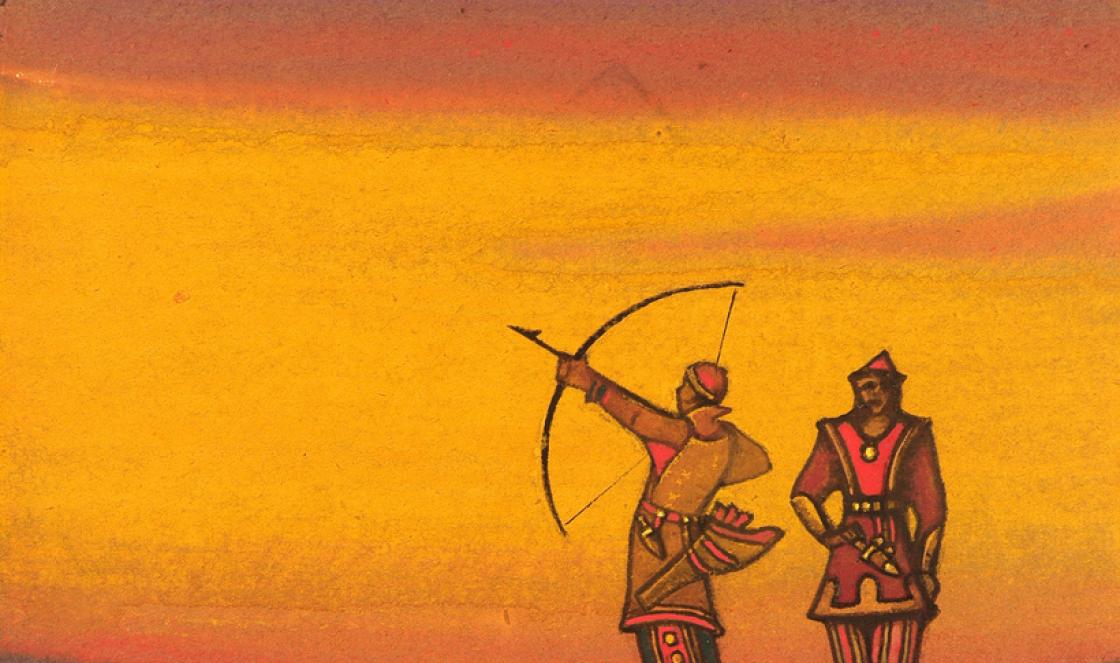Readers interested in the social and political life of the country remember the IV International Arctic Forum "The Arctic - Territory of Dialogue", which took place in Arkhangelsk at the end of March. As part of this event, a number of important agreements were concluded on international cooperation V various fields life in the Arctic.
As part of the forum, a roadmap for the project “Children of the Arctic. Preschool education". And although, in addition to the leaders of the Federal Agency for Nationalities of Russia and the Association of Indigenous Peoples of the North, Siberia and Far East then the heads of only five Arctic regions (Yakutia, Komi, Yamal, Khanty-Mansi Autonomous Okrug-Yugra and the Arkhangelsk region) signed up, now many heads of other regions are ready to join the project.
The project is to create conditions for indigenous children to receive a quality education, taking into account their culture and language. To do this, the first stage involves the study of methods in the regions and abroad, identifying the best teaching practices among them. Then all the information will be analyzed and discussed by specialists in order to create the most effective training program and apply it in the national schools of Russia.
On June 22, the Ministry of Education and Science of Yakutia, together with the Ministry of Development of Civil Society Institutions of Yakutia, held a meeting on the implementation of the first stage of the project via videoconference, which was attended by representatives of the interested bodies of the five subjects participating in the project, and from our side, in addition to specialists from ministries, representatives of ethnic associations .
During the meeting, specialists from the Arctic regions emphasized that Yakutia, along with Yamal, rightfully occupies a leading position in the field of education of the northern peoples. Indeed, our republic is doing a lot to preserve and develop the languages and culture of the indigenous peoples of the North, which was described in detail in her speech by the First Deputy Minister of Education and Science of the RS (Y) Feodosia Gabysheva. Feodosia Vasilievna drew attention to the experience of Yakutia in the field of nomadic schools and the prospect of creating nomadic kindergartens. Emphasized the importance of reducing the requirements of supervisory authorities for nomadic educational institutions. According to the deputy minister, there are already those wishing to open nomadic kindergartens, but it is very difficult for them to obtain the required licenses. Another issue that Feodosia Gabysheva drew attention to is an increase in funding standards. She also noted the importance of the adoption by Yakutia of the regional law "On the Nomadic Family", which is designed to support families that continue to lead the traditional nomadic way of life.
The moderator of the meeting, Deputy Minister for the Development of Civil Society Institutions Lena Ivanova, gave the floor to all participants of the videoconference in turn to provide analytical material on the ongoing work within the framework of the project “Children of the Arctic. Preschool education".
Yamal specialists said that at the end of August they are ready to launch a pilot project “Getting Ready for School” in the region, when a large-scale consultation route will pass through the Nenets nomads, in which colleagues from Finland will also take part. By the way, all regions participating in the project will also be represented at this event. Each region has its own characteristics, for example, in the Arkhangelsk region there is no longer a nomadic population, and representatives of the peoples of the North receive education in Russian. And the greater the significance of this project. Recall that the Saami managed to reverse the situation with their native language, when its speakers were extremely few. Thus, each region must present its vision for the education of indigenous children, all methods will be published on the website of the All-Russian Association of Indigenous Peoples.
After the end of the video conference in the hall, an exchange of views took place among specialists and representatives of the indigenous peoples of the North, during which the program "Children of the North" was mentioned several times, which was curtailed back in the 90s. This pro-
Gram offered an integrated approach to training, supply educational institutions and recreation for children. The participants of the meeting emphasized that, ideally, one should strive for the Children of the Arctic project to be aimed at achieving results in its development.
that vast program. But the main thing is still the creation of such a methodology that would allow providing the population with a quality education without compromising traditions and
language. Feodosia Gabysheva called on the public to jointly promote the much-needed project in Yakutia, offer their ideas and take part in their implementation.
One hundred children from Yamalo-Nenets and Khanty-Mansiysk autonomous regions, Arkhangelsk region, Yakutia and Komi will go on vacation on the Black Sea coast. Rest will be organized within the framework of the project “Children of the Arctic. Preschool education". In Anapa, for preschoolers from families of indigenous peoples of the North, both tourist and educational program, reports TASS.
Children from the Arctic regions will have the opportunity to get to know the south of Russia and show their talents. During the camp shift in Anapa, children will try their hand at sports, creativity, and communicate with peers from other regions of Russia.
Project “Children of the Arctic. Preschool Education” is implemented with the support of the Federal Agency for Nationalities Affairs (FADN) and is distributed to the younger generation of the population of the Arctic territories of Russia.
Russian President Vladimir Putin has promised that family members of 2018 World Cup FAN ID holders will be able to receive free visas to Russia by the end of the year. The head of state announced this during a conversation with the volunteers of the 2018 World Cup. "Did you hear I'm... →
The Moscow Urban Forum is taking place in the Russian capital, the theme of which is “Megapolis of the Future. New space for life. Alice Charles, Leading Specialist on Urban Development at the World Economic Forum in Geneva... →
Next weekend, July 28-29, the Enlightener festival will take place on the island of Valaam in Karelia. The event annually gathers performers of Orthodox chants. This time it will be choirs and representatives not only of Russia (Mining and... →
Russia has entered the top five world leaders in a number of areas in science, TASS reports on Thursday, citing a study conducted by specialists from the Institute statistical studies and knowledge economy NRU graduate School economy. Agree...
Today, within the framework of the International Arctic Forum, the FADN Russia project “Children of the Arctic. Preschool education". The roadmap for the implementation of the first stage of the project was signed by the head of the Federal Agency for Nationalities Affairs Igor Barinov, the heads of the subjects of the Arctic zone of the Russian Federation: the head of the Republic of Sakha (Yakutia) Yegor Borisov, the head of the Republic of Komi Sergey Gaplikov, the deputy governor of the Arkhangelsk region Ekaterina Prokopyeva, the governor of the Yamalo-Nenets autonomous region Dmitry Kobylkin, as well as the Governor of the Khanty-Mansiysk Autonomous Okrug Natalya Komarova, President of the Association of Indigenous Peoples of the North, Siberia and the Far East Russian Federation Grigory Ledkov.
Project “Children of the Arctic. Preschool Education" involves an analysis of the best educational practices, a study of the level of cognitive skills of indigenous children in the Arctic zone of the Russian Federation, the development of an educational program and methodological materials for teachers of nomadic schools, the creation of an international Internet resource "Children of the Arctic" with information on educational practices for indigenous peoples in countries the arctic region.
“Our task is to develop for teachers of nomadic schools modern educational programs And teaching materials, taking all the best from Russian experience and international practices. At the same time, it is important to keep teaching in the educational process. mother tongue, traditions of indigenous peoples,” Igor Barinov emphasized.
As part of the first phase of the project, it is planned: preparation of joint programs to improve the quality preschool education indigenous peoples, with an emphasis on the preservation of native languages; acquaintance of experts with educational practices in the field of preschool education of the Yamalo-Nenets Autonomous Okrug; action "Getting ready for school" (opening by general educational and preschool organizations of the Yamalo-Nenets Autonomous Okrug of seasonal structural units, groups preschool in places of nomads); expert survey of specialists in the field of early childhood child development and upbringing.
“This is the first project in the field of education for indigenous children implemented by Russia since joining the Arctic Council in 1996. Norway and Finland expressed their interest in it. Russia and Finland have already begun joint preparations for the implementation of the first stage of the project,” said the head of the FADN of Russia.
For reference
The project "Children of the Arctic" is the first in the field of education for children of the indigenous peoples of the Arctic zone, which Russia has launched since joining an international organization (in the Arctic Council since 1996). It is implemented jointly with the Association of Indigenous Peoples of the North, Siberia and the Far East of the Russian Federation, the Government of the Yamalo-Nenets Autonomous Okrug, which acts as a pilot region, and representatives of the scientific community.
Interest in the implementation of the project was expressed by Norway and Finland, chairing the Arctic Council. Russia and Finland have already begun preparations for the implementation of the first phase of the project aimed at collecting and analyzing information on practices and programs implemented in the field of preschool education for children of the indigenous peoples of the Arctic zone.





